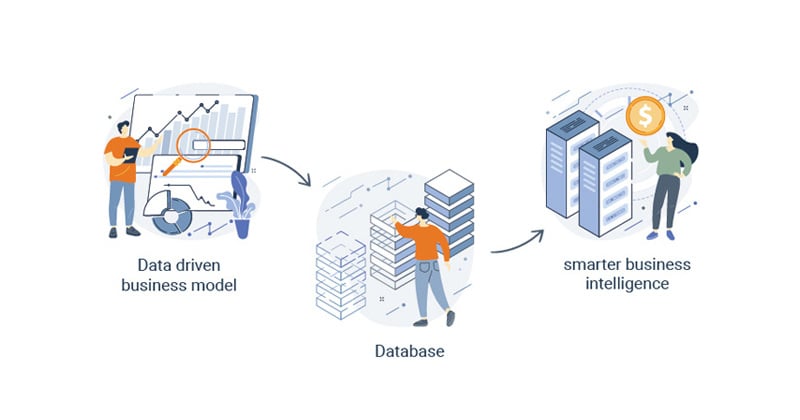- Home
- Data Management
- Data Integration
Dynamics 365 Data Integration
Configure two-way integrations 30-50% faster than a developer from Microsoft Dynamics 365 without any ongoing maintenance and reduced risk!
An advanced platform for data imports and exports built within Microsoft Dynamics 365 F&SCM. Ease data integration, transformation, monitoring, data extraction, and preparation without development.
See our Data Integration Solution for Dynamics 365 F&SCM in action!
Book your free demo today!


Data Integration for Dynamics 365 F&SCM
Meet any Dynamics 365 integration requirement with our highly configurable, embedded Data Integration Solution that enables D365 business users to create, monitor, and manage system-to-system integrations by themselves, without any development. Not only does this advanced solution help you simplify complex integrations in D365 but also allows you to transform raw data into meaningful business insights through no-code data preparation and extraction.
When business systems are isolated, you miss the big picture. With our Data Integration Solution, ensure that your application landscape is seamlessly connected with your Dynamics 365 F&SCM ERP in a fast, efficient, and secure way. Our point-and-click, model-driven solution helps you combine data across different sources, making it easy for business users to extract quality data for faster analytics. Moreover, the solution helps you perform unlimited integrations simultaneously, avoid customizations, resolve integration errors, and ensure that your Dynamics 365 integrations run at peak efficiency with minimal downtime.
Our solution comes with out-of-the-box connectors and is meticulously designed to support any integration scenario with any ISV solution, external application, legacy system, or with the cloud— no matter how complex.
Key Challenges
Increased cost of integration projects
Relying too much on development
No direct access to production data
Key Features
Scroll to
Advanced data manipulation
Data Integration Solution allows for data transformations, default values, and conversions. You can do form mapping or conditional mapping for advanced data manipulation to help you deal with the complexities of the D365 F&SCM data model. The form mapping function helps you select the exact corresponding field on a form for the original input fields so that you can map to the database yourself.
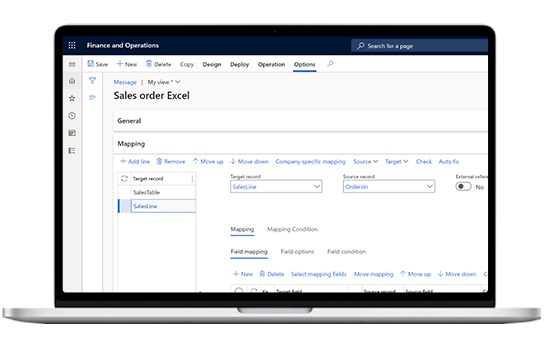
Multiple format support
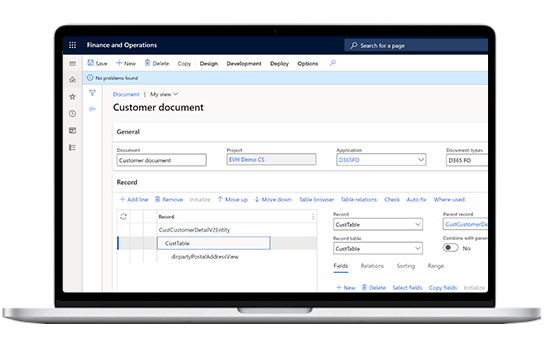
Timely error resolutions
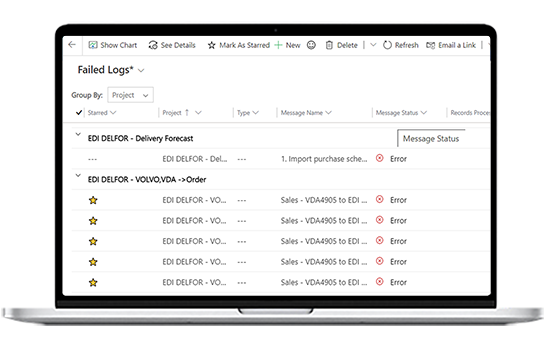
Benefits
Ensure secure, successful, and stable Dynamics 365 integrations with any external application or 3rd-party system (no matter how complex!) without leaving the D365 environment.
Set up and maintain complex business integrations between Dynamics 365 F&SCM and other ERP or e-Commerce systems effortlessly, without the need for coding.
Easily monitor integration performance in real-time on your mobile devices or tablets and receive real-time alerts, in case there’s an integration failure.
Configure any complex data integration in Dynamics 365 F&SCM using tables, views, entities, or a combination of these in a flexible manner, without the help of a developer.
Accelerate the time to market on analytics delivery by enabling data stewards to load, clean, classify, prepare, and extract data in Dynamics 365 F&SCM easily, without relying on a skilled workforce.
Easily pre-process your data once it’s extracted and ensure your business applications have quality data in Dynamics 365 with our solution’s master data validation capabilities.
Features
Point-and-click integration

Point-and-click integration
Easily create, maintain, monitor, and optimize Dynamics 365 integrations with our fully configurable, no-code application integration, integration monitoring, and data modeling solution.
Intuitive integration monitoring

Intuitive integration monitoring
Attain complete visibility into integration health, track and optimize integrations across your Dynamics landscape, and ensure they run at peak efficiency with minimal downtime.
Simplified data preparation

Simplified data preparation
Easily process large data volumes and simplify the entire data preparation and extraction process by modeling, cleaning, transforming, and combining your Dynamics 365 F&SCM data.
Improved Dynamics 365 integrations

Improved Dynamics 365 integrations
Configure integrations with any external or internal business system as well as with other Microsoft ISV solutions in the cloud directly, without using Azure tools like Logic Apps or Azure services.
Embedded in Dynamics 365 F&SCM

Embedded in Dynamics 365 F&SCM
Data Integration Solution has been built within Dynamics 365 F&SCM, using the ERP’s business logic, and can be accessed from the F&SCM dashboard, thereby offering you a familiar user experience.
Frequently asked questions
How can you support us in educating our team to make use of Data Integration Solution?
We provide multiple ways for you to train and make the best of Data Integration Solution – from 1-2 min on-demand training videos to virtual and/or in-person trainings spanning a full day – where we dive deeper into your use cases and tailor the trainings to your specific needs. We also provide implementation support for the product.
Does the solution undergo regular software/application updates?
Yes. STAEDEAN's solutions follow the quarterly release schedule and are delivered free of cost to our customers. And since Data Integration Solution is embedded within Dynamics 365, every time Microsoft upgrades, our solution is also thoroughly tested for every upgrade.
Is there a maximum number of integrations that can be done with your solution?
No limits! You can set up both synchronous and asynchronous integrations per legal entity, without any limits, and without having to deploy them one after the other.
What kind of capabilities should a person have in order to use Data Integration Solution?
Nothing specific. Knowledge of Dynamics 365 F&SCM is sufficient to help you map the integration specifications. Knowledge of which connector types to choose while setting up an integration helps as well. Overall, a familiarity with the systems landscape and integration methods helps – no hard skills required, otherwise.
We have used Microsoft data entities in the past. Can we still use them if we migrate to Data Integration Solution?
Why should I consider Data Integration Solution when Microsoft offers the Data Management Framework (DMF) for data mapping?
Do we need to subscribe to any additional Azure components if we want to use the solution’s data preparation and extraction capabilities?
Resources
Scroll to
Data Integration Solution for D365 F&SCM | Factsheet

Don't Fall Victim to Poor Integrations! | eBook

Navigating Integrations in D365 F&SCM | Whitepaper

Build Versus Buy: Application Integration Software for D365 F&SCM
 Khalil Bouzidi
Khalil Bouzidi
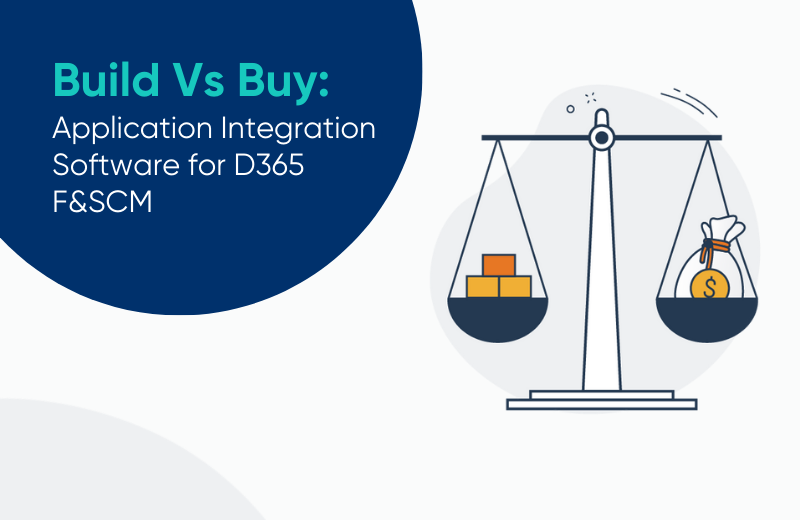
Implementation Pitfalls of Enterprise Application Integration for D365 and Ways to Overcome Them
 Khalil Bouzidi
Khalil Bouzidi

What is a Data Modeling Tool and Why Do Organizations Need It?
 Marijn Westeneng
Marijn Westeneng
